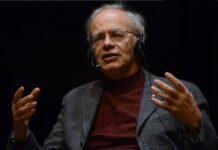V reviji Los Angeles Review of Books je danes objavljen dober “uvod v Žižka”, ki ga je napisal Adam Kotsko: How To Read Žižek. Navajam zgolj nekaj odlomkov:
“Ideology” is one of those philosophical terms that has entered into everyday speech with an impoverished meaning. … “ideology” tends to refer to a body of beliefs, most often with overtones of inflexibility or fanaticism. But as Žižek argued in his 1989 book The Sublime Object of Ideology, ideology is not to be found in our conscious opinions or convictions, but as Marx suggested in our everyday practices. …
Racism, for example. Žižek recommends that we look for symptomatic contradictions, as when the anti-Semite claims that the Jews are both arch-capitalist exploiters and Bolshevik subversives, that they are both excessively tied to their overly particular tradition and deracinated cosmopolitans undercutting national traditions. … In contemporary America, Mexican immigrants are viewed at once as lay-abouts burdening our social welfare system and as relentless workaholics who are stealing all our jobs.
These contradictions don’t show that ideology is “irrational” — the problem is exactly the opposite, that there are too many reasons supporting their views. Žižek argues that these piled-up rationalizations demonstrate that something else is going on.
…
Yet there’s something special about the treatment of Žižek. In what has become a kind of ritual, the reader of a review of Žižek’s work always learns that Žižek is simultaneously hugely politically dangerous and a clown with no political program whatsoever, that he is an apologist for the worst excesses of twentieth-century Communism and a total right-wing reactionary, both a world-famous left-wing intellectual and an anti-Semite to rival Hitler himself.The goal is not so much to give an account of Žižek’s arguments and weigh their merits as to inoculate readers against Žižek’s ideas so they feel comfortable dismissing them.
…
So when people in the U.S. produce the vision of the Mexican immigrant as the workaholic welfare queen, what is really at stake can’t be a conflict between cultures, because for Žižek that would imply pre-existing, more or less stable or homogeneous cultures that first exist and then subsequently happen to come into conflict. Nor can it be about the Mexicans who come to America and disturb the balance of our local culture, because that balance didn’t exist in the first place. No, the conflict is inherent in capitalist exploitation. The Mexicans aren’t taking “our” jobs — the owners are doing whatever they can to suppress wages, with no interest in who they pay.The example of immigration demonstrates that conflict is never truly eliminated, but can be shifted. The task of the critic is to shift the conflict back to its proper place. Since straightforward argument presupposes a shared frame of reference, it is not a suitable tool for carrying out the kind of frame-shifting that Žižek is trying to achieve. More indirect methods are necessary.
One of Žižek’s primary tactics for shifting the frame of reference is overidentification.
…
In this situation, where liberals are continually conceding that the right wing is expressing “legitimate concerns,” Žižek says essentially: yes, they are expressing legitimate concerns, but not the ones they think they’re expressing. To return to the immigration example, Žižek would proceed by agreeing that right-wing outbursts should be taken seriously — not as signs of the need for a more homogeneous culture, or for preserving American jobs, or for keeping foreigners from overwhelming the welfare state, but as symptoms of the disruptive contradictions of capitalism. Similarly, when liberals acknowledge that conservatives have a point about the need to preserve “the European tradition” or “the Christian heritage,” Žižek agrees that they do indeed have a point: we absolutely need to preserve the European tradition of radical revolution and the Christian heritage of radical equality! He shifts the conflict from one between liberals and conservatives to the one at the heart of the cultural tradition itself.This strategy of overidentification — which can be summarized in the vertiginous formula, “Yes, of course I agree completely, but aren’t you actually completely wrong?!” — may be difficult to follow, but it produces jolting shifts that could not easily be produced any other way.
…
Žižek does not hold out the utopian hope of eliminating all conflict — in fact, he believes our supposedly “post-ideological” era is blinded by the truly utopian hope that all genuine conflicts might be resolved, allowing the system of liberal-democratic capitalism to go on more or less forever. What Žižek hopes for, in tracking down the contradiction at the heart of our society and identifying with the class that embodies it, is not that the world will no longer suck, but that it will no longer suck in this particular way, that we will no longer be stuck in this particular vicious cycle, that we can somehow find a way to stop frantically grasping at rationalizations for our self-destructive fixations and do something else — in short, to jolt us into the realization that there is an alternative.

















Najboljši način kako brati Žižka, je brati Žižka. Preveč je bedakov, ki se nad njim zmrdujejo, pa ga še nikoli niso vzeli v roke. Sam občasno berem njegove knjige, še bolj pa spremljam predavanja in intervjuje na Youtubeu. Tako počasi, počasi dobiš nek "feeling". Sicer so pa pomembne lastnosti: – zavrnitev postmodernističnega relativizma (resnica ni "obojestranska", ampak enostranska) – zavračanje vsake psihologizacije in poudarek na zunanjem (prakse, pravila), namesto na notranjem (čustva, nameni, sebični interesi) – zavračanje liberalnih tabujev in zavračanje verjetja v "konec zgodovine" in še in še… Sam bi Žižka razdelil na več "žanrov". Od precej lahko razumljivih… Beri dalje »
Boris, strinjam se s tabo, enostavno brati/poslušati ga. Je pa res, da če ga želiš Brati, moraš poznati še vsaj delo dveh drugih veličin, Hegla in Lacana. Poleg tvojega opisa bi dodal mogoče tudi sam naslednje, žal je še vedno preveč bedakov, ki so nad njim navdušeni, pa nimajo pojma zakaj so navdušeni. Glede Resnice bi sam mogoče poudaril Žižkovo lacanavstvo, torej razmislek na podlagi "teze" o ne-celi Resnici, Resnici, ki je vedno "razpršena". Na mestih Žižek išče argumente tudi v kvantni mehaniki, "nedoločenost Resnice". Sicer nepomembno, vendar bi dodal zgolj še, da sam Žižka vidim v zgolj dveh "žanrih"… Beri dalje »
Sam osebno ne poznam nobenih bedakov, ki se nad njim navdušujejo, morda je "krog oboževalcev Žižka" v Sloveniji za to premajhen. Če pa že pride do tega, je to najbrž zaradi enostavnejših anekdot s katerimi skuša ponazoriti globalne družbene procese. Žižek je po izobrazbi sociolog in filozof. Še najlažje razumljive so njegove generalne sociološke analize, ki jih seveda začini s primeri iz filmov in pop kulture, tudi z anekdotami iz filozofije in znanosti. Denimo tisto štorijo o podkvi nad vrati Nielsa Bohra je ponovil že ničkolikokrat, pa vendarle gre za krasen in temeljni uvod v razumevanje ideologije po Žižku, ki… Beri dalje »
Tudi sam osebno poznam zgolj enega takšnega bedaka, vsako jutro ga uzrem v ogledalu, ampak … Predlgam pa, da se udeležiš njegovega predavanja, počakaš, da se ljudje lepo usedejo, potem pa pojdi od enega do drugega (M. Dolarja in A. Zupančič preskoči) in se jim predstavi. Tako boš tudi osebno spoznal tudi nekaj takšnih bedakov. 🙂 V osnovi se zelo strinjam s tabo. Mogoče bi sam dodal, da vidim manjši problem v tej tvoji formulizaciji: "… gre za krasen in temeljni uvod v razumevanje ideologije po Žižku, ki deluje tudi če v svoji "notranjosti" vanjo ne verjameš.". Torej po moje… Beri dalje »
Sploh ni zgrešeno, Žižka zelo dobro berete, pa čeprav ga v "realnosti" morda malo čitate, ni važno. "Zelo dobro vem, pa vendar", to je temelj ideologije. Praksa je močnejša od verjetja, močnejša je celo od vednosti. Po Pascalu, prakse, celo mikro prakse -generirajo duha. Iz tovrstne zakladnice jemlje tudi Žižek.